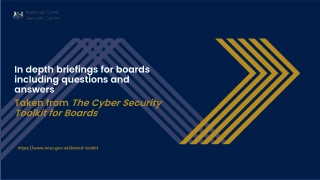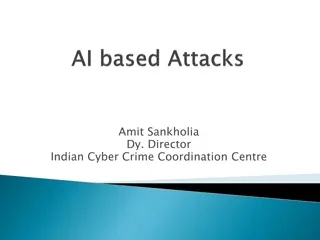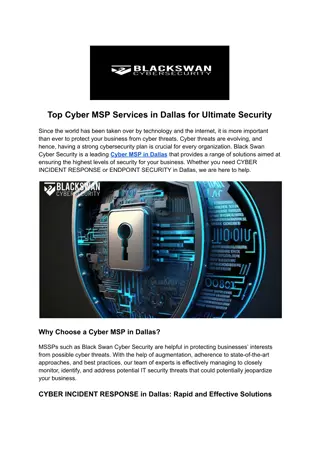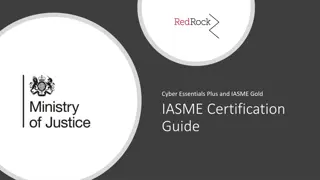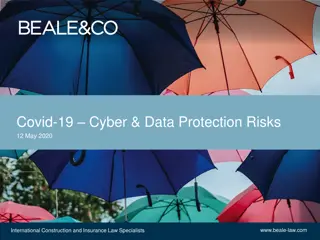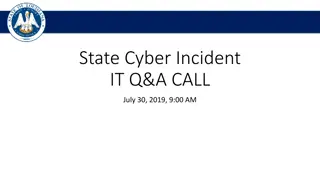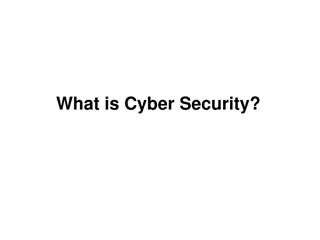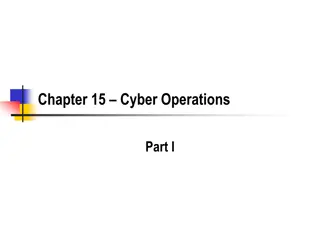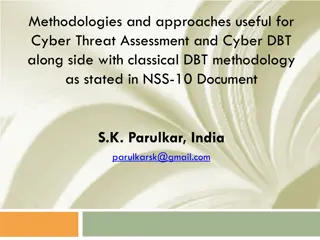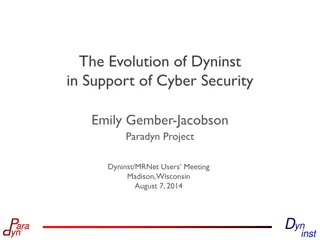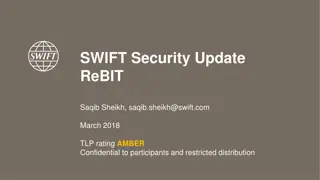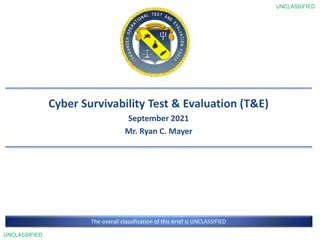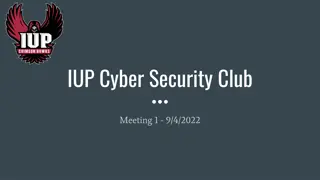Cyber Security Career Opportunities
Explore the various career opportunities in the field of cybersecurity and discover how you can get started in this fast-growing industry. Learn about entry-level cybersecurity jobs and the skills and certifications required for each role.
Download Presentation

Please find below an Image/Link to download the presentation.
The content on the website is provided AS IS for your information and personal use only. It may not be sold, licensed, or shared on other websites without obtaining consent from the author.If you encounter any issues during the download, it is possible that the publisher has removed the file from their server.
You are allowed to download the files provided on this website for personal or commercial use, subject to the condition that they are used lawfully. All files are the property of their respective owners.
The content on the website is provided AS IS for your information and personal use only. It may not be sold, licensed, or shared on other websites without obtaining consent from the author.
E N D
Presentation Transcript
CYBER SECURITY CAREER OPPORTUNITIES Cyber Security Training Workshop
INTRODUCTION Cybersecurity professionals are in demand. According to a study by the cybersecurity professional organization (ISC), there are some 3.1 million unfilled positions worldwide. Working in the cybersecurity field also gives you the chance to work in a fast-paced environment where you continually learn and grow. Cybersecurity might be worth considering if you re already in the world of Information Technology (IT) or looking to make a career switch. We will look at some of the many roles available to cybersecurity professionals. We ll also discuss how to get started in cybersecurity and what your career path might look like.
ENTRY-LEVEL CYBERSECURITY JOBS For some roles, the National Security Agency (NSA) defines entry-level as requiring a bachelor s degree plus up to three years of relevant experience less with higher-level degrees. Most cybersecurity professionals enter the field after gaining experience in an entry-level IT role. Here are a few of the most common entry-level jobs within the bigger world of cybersecurity.
ENTRY-LEVEL CYBERSECURITY JOBS Information Security Analyst (Average salary: $89,795) Feeder role: Network or systems administrator As an information security analyst, you help protect an organization s computer networks and systems by: Monitoring networks for security breaches Investigating, documenting, and reporting security breaches Researching IT security trends Helping computer users with security products and procedures Developing strategies to help their organization remain secure.
ENTRY-LEVEL CYBERSECURITY JOBS Information Security Analyst Common Certifications: CompTIA Security+, GIAC Certified Intrusion Analyst (GCIA), GIAC Certified Incident Handler (GCIH) Related job titles: Cybersecurity analyst, IT security analyst
ENTRY-LEVEL CYBERSECURITY JOBS Information Security Specialist (Average salary: $93,885) Feeder role: Networking, IT support, systems engineering In this role, you re the company s point person for security, ensuring that data remains secure against unauthorized access and cyberattacks. Responsibilities for security specialists vary from organization to organization but may include: Testing and maintaining firewalls and antivirus software Implementing security training Researching new security risks Suggesting improvements for security weaknesses
ENTRY-LEVEL CYBERSECURITY JOBS Information Security Specialist Common certifications: CompTIA Security+, Systems Security Certified Practitioner (SSCP), GIAC Security Essentials (GSEC) Related job titles: Cybersecurity Specialist, Information Security Specialist
ENTRY-LEVEL CYBERSECURITY JOBS Digital Forensic Examiner (Average salary: $92,565) Feeder role: IT Support, Risk Analyst If you enjoy seeking clues to solve a puzzle, this role might be for you. Digital forensic investigators retrieve information from computers and other digital devices to discover how an unauthorized person accessed a system or to gather evidence for legal purposes. Day-to-day tasks might include: Collecting, preserving, and analyzing digital evidence Recovering data from erased or damaged hard drives Documenting the data retrieval process and maintaining chain of custody Assisting law enforcement in criminal investigations Providing expert testimony in court proceedings
ENTRY-LEVEL CYBERSECURITY JOBS Digital forensic examiner Common certifications: GIAC Certified Forensic Analyst, EnCase Certified Examiner (EnCE), Access Data Certified Examiner (ACE) Related job titles: Computer forensic specialist, cyber forensic specialist, digital forensics analyst
MOVING UP: MID-LEVEL AND ADVANCED CYBERSECURITY JOBS Security Systems Administrator Feeder role: Systems administrator, information security analyst In this role, you re typically put in charge of the day-to-day operations of an organization s cybersecurity systems. Your responsibilities might include: Monitoring systems and running regular backups Managing individual user accounts Developing and documenting security procedures for the organization Collaborating with security teams to respond to unwanted intrusions Participating in company-wide security audits
MOVING UP: MID-LEVEL AND ADVANCED CYBERSECURITY JOBS Security Systems Administrator Common certifications: Certified Information Systems Security Professional (CISSP), Certified Information Security Manager (CISM) Related job titles: Security administrator, cybersecurity administrator, information security officer
MOVING UP: MID-LEVEL AND ADVANCED CYBERSECURITY JOBS Penetration tester (Average salary: $97,383) Feeder role: Information security analyst, incident responder As a penetration tester (pen tester for short), you ll help businesses identify their security weaknesses before malicious hackers can do the same. You do this by attempting to breach computer networks with the company s permission. Tasks might include: Planning, designing, and carrying out penetration tests Creating reports on test results and offering recommendations to security decision-makers Developing scripts to automate parts of the testing process Conducting social engineering exercises (attempting to get company employees to disclose confidential information) Providing technical support during incident handling
MOVING UP: MID-LEVEL AND ADVANCED CYBERSECURITY JOBS Penetration Tester Common certifications: Certified Ethical Hacker (CEH), CompTIA PenTest+, GIAC Certified Penetration Tester (GPEN) Related job titles: White Hat hacker, Ethical hacker, Vulnerability Assessor
MOVING UP: MID-LEVEL AND ADVANCED CYBERSECURITY JOBS Other Cybersecurity jobs include: Security Engineer (Average salary: $128,893) Common certifications: Certified Information Systems Security Professional (CISSP), Certified Cloud Security Professional (CCSP) Security Architect (Average salary: $195,333) Common certifications: Certified Information Systems Security Professional (CISSP), Certified Information Security Manager (CISM), CSA Certificate of Cloud Security Knowledge (CCSK)
HOW TO GET A JOB IN CYBERSECURITY? While requirements for cybersecurity jobs vary widely from company to company, you might notice some common trends. Let s take a closer look at some of the requirements and how you can go about meeting them to get your first cybersecurity job.
EDUCATIONAL REQUIREMENTS Many jobs in security list a bachelor s degree in computer science, information technology, or a related field as a requirement. While degrees are common among professionals in the cybersecurity industry, they re not always required. Having a bachelor s or master s degree can often create more job opportunities, make you a more competitive candidate in the cybersecurity job market, or help you advance in your career.
CYBERSECURITY CERTIFICATIONS Typically, cybersecurity job postings may request at least one certification. You ll find more than 300 different certifications, and the quality isn t always the same. If you re new to cybersecurity, consider starting with a more foundational certification, like the CompTIA Security+. From there, you can begin gaining the necessary work experience to earn more advanced certifications.
IN-DEMAND CYBERSECURITY SKILLS To prepare for a cybersecurity role, start building your technical and workplace skills through online courses, boot camps, or self-study. These skills are a good place to start: Cloud Security Programming (especially scripting) languages Encryption Risk assessment Intrusion detection Problem-solving Analytical thinking
RED, BLUE, AND PURPLE TEAMS Conducting Red team vs. Blue team exercises can be an eye- opening experience. Whether they're testing an organization's cybersecurity defenses against threats or assessing the talent of security team members, such simulated attacks can be beneficial for companies of all shapes and sizes.
Red Teams are internal or external entities dedicated to testing the effectiveness of a security program by emulating the tools and techniques of likely attackers in the most realistic way possible. The practice is similar, but not identical to, Penetration Testing and involves the pursuit of one or more objectives usually executed as a campaign. RED, BLUE, AND PURPLE TEAMS Common red team techniques include: penetration testing; phishing, social engineering, and other forms of credential theft mechanisms; port scanning; and vulnerability scanning.
RED, BLUE, AND PURPLE TEAMS Blue Teams refer to the internal security team that defends against both real attackers and Red Teams. Blue Teams should be distinguished from standard security teams in most organizations, as most security operations teams do not have a mentality of constant vigilance against attack, which is the mission and perspective of a true Blue Team.
RED, BLUE, AND PURPLE TEAMS Purple Teams exist to ensure and maximize the effectiveness of the Red and Blue teams. They do this by integrating the defensive tactics and controls from the Blue Team with the threats and vulnerabilities found by the Red Team into a single narrative that maximizes both. Calling the purple team a "team" is a bit misleading. The purple team is, in fact, not a standalone team but a mix of blue and red team members.
NETWORKING TIPS When starting a new career path, it's helpful to network with industry professionals to learn more about the field and to create mutually beneficial relationships.
THE END Thank you for listening



